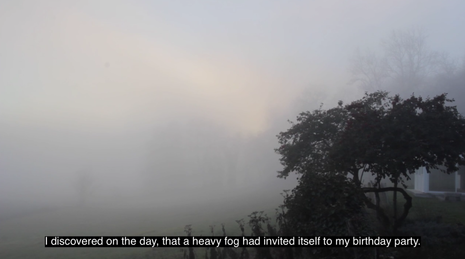Q&A with Film at Jesus
Syna Majumder talks student film competitions with Film at Jesus co-presidents Mabel van Zwanenberg Rouse and Rebekah Garrish
Favourite short film?

Mabel: Live Forever as You Are Now with Alan Resnick (2011). It’s a short from Adult Swim’s Infomercials series.
Rebekah: Three short stop-motion tales in one: The House (2022), directed by Emma De Swaef, Niki Lindroth von Bahr, Marc James Roels and Paloma Baeza.
Favourite screenplay?
M: Is it really embarrassing if I admit that the majority of screenplays I’ve engaged with are Doctor Who scripts? If it isn’t, then I really like the Smith and Jones screenplay, and the one for Father’s Day too!
R: The script to Eternal Sunshine of the Spotless Mind (2004), written by Charlie Kaufman and directed by Michel Gondry. Each word embodies the characters; it’s almost as if you can hear them as you read.
“We are looking for films that are new and unconventional”
For readers who may not be aware, what is Film at Jesus?
M: Film at Jesus is a society based at Jesus College focused on those interested in film. Both our screenings (once every two weeks during term) and our film competitions (termly) are entirely free!
You’re running a Lent term screenplay and short film competition currently, and ran a winter short film competition before that. How did you know the Cambridge student film scene was vibrant enough to stand up to routine inspection?
R: At this point, it’s traditional for the society to have these competitions each term. Students at Cambridge are exceptionally creative, and it’s important to support that creativity lest academic stress snuff it out. We hope it’s the informality of Film at Jesus that attracts students. A submission could be a project in your spare time, or a small task you return to over a few weeks, as it tracks your creative progress.
Talk to me about the steps taken to organise a competition like the one you’re running currently.
R: The first thing we consider is the competition’s timeframe. We want to give filmmakers the holiday to have fun with filming and explore styles of editing. Then we decide whether the category will be open or if there’s a certain theme we’d love to see. Previously, we’ve had specific topics like “One second a day” or “the Rashomon effect” (showing the same events from multiple people’s perspectives).
We organise the event on FilmFreeway, listing the rules and providing consent forms for completion by actors. Next comes advertising: we post to say the competition has started, and follow that with a series of prompts to support the filmmakers until the competition ends. The judges then have a week to watch the films. At this point, the co-president role splits into admin-related and social tasks. One co-president contacts the winners to award them their prize money. They book the room for the winners screening, while the other focuses on advertising the event and inviting students who submitted films. When the screening comes around, we’re always so excited to share the winning short films and all the kind words the judges had to say.
“Learning what to cut and what to keep is an invaluable skill”
Who judges the work submitted to the termly film competition?
M: Our competitions are always judged by the master of Jesus, Sonita Alleyne, and screenwriter James McCarthy. Recently, we had guest judge Laura Mansfield, co-founder of Outline and CEO of Screenskills – a company that offers courses and training on various fields in the film industry!
What parameters are the short films judged on?
R: We’re looking for films that are new and unconventional. Technical achievements (like camerawork, cinematography and sound) are rewarded, but the emphasis is on narrative and creative vision. We accept films of all styles. There are a few technical requirements: films must be under five minutes and anonymised but can include curse words if used in the appropriate context. Any music must be copyright-free and actors must consent to the film being published online or screened during film festivals.
What parameters are the screenplays judged on?
M: We want to see what you do with the limitations. Five pages is not a lot of space. Screenplays benefit from exercising judiciousness rather than abundance. Learning what to cut and what to keep is an invaluable skill. Having such little time and space really challenges expository ability. How do you establish who, what, where, when in only a few pages? It’s a great way of ensuring that your dialogue is multi-functional and efficient.
A moment from a student film you’ve seen that really stuck with you.
M: The use of diegetic sound in Lisa-Marie Soulier’s The Kitchen. The way voices and pans and music all came together to register this soundscape awoke a warm feeling of home. It was really intimate sound design – a trait shared with great slice of life films! – and worked very well.
As a student film society, you also run screenings. How do you choose what thematic focus to pick each term?
R: One of the co-presidents may watch a film over the holidays that they really enjoy, and from there we try to find three more films that suit it thematically. Watching Nausicaä of the Valley of the Wind (1984) shaped our eco-critical take on the “dystopian” theme this Michaelmas. We take into account the date of production, mediums used and messages shared, so we can offer a keen representation of the thematic focus.
Any chance we can get an exclusive peek at the theme planned for Easter? No pressure.
M: Haha, of course we can give you a sneak peek! Take our hands, and let’s go wandering into the woods. To end our first year heading Film at Jesus, we’re going to screen folk films!
Let us know the deadline for those who might wish to submit.
R: The deadline for the Lent Term Film Competition is Tuesday 30 April.
 Features / Should I stay or should I go? Cambridge students and alumni reflect on how their memories stay with them15 December 2025
Features / Should I stay or should I go? Cambridge students and alumni reflect on how their memories stay with them15 December 2025 News / Cambridge study finds students learn better with notes than AI13 December 2025
News / Cambridge study finds students learn better with notes than AI13 December 2025 News / Dons warn PM about Vet School closure16 December 2025
News / Dons warn PM about Vet School closure16 December 2025 Comment / The magic of an eight-week term15 December 2025
Comment / The magic of an eight-week term15 December 2025 News / News In Brief: Michaelmas marriages, monogamous mammals, and messaging manipulation15 December 2025
News / News In Brief: Michaelmas marriages, monogamous mammals, and messaging manipulation15 December 2025









